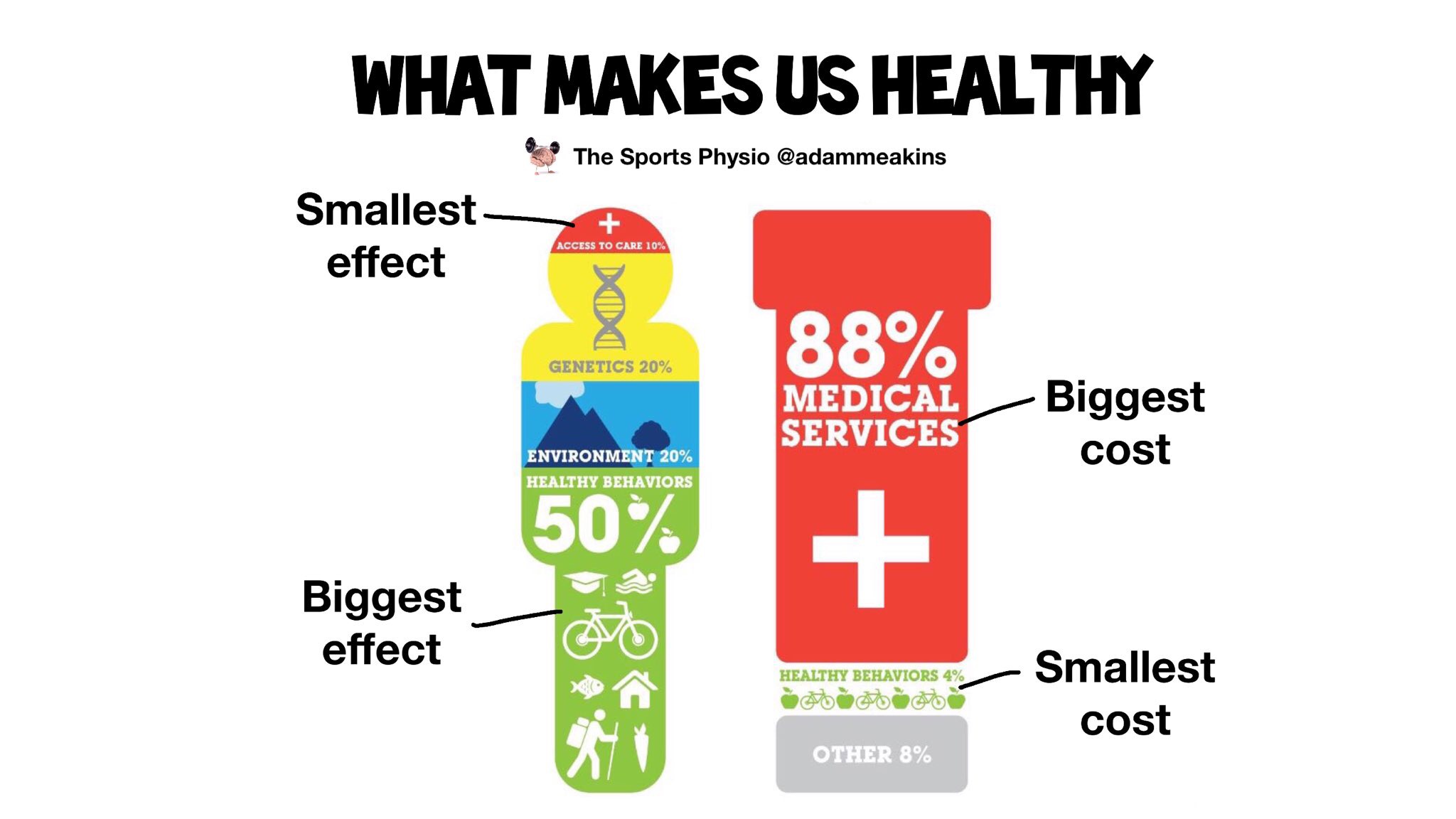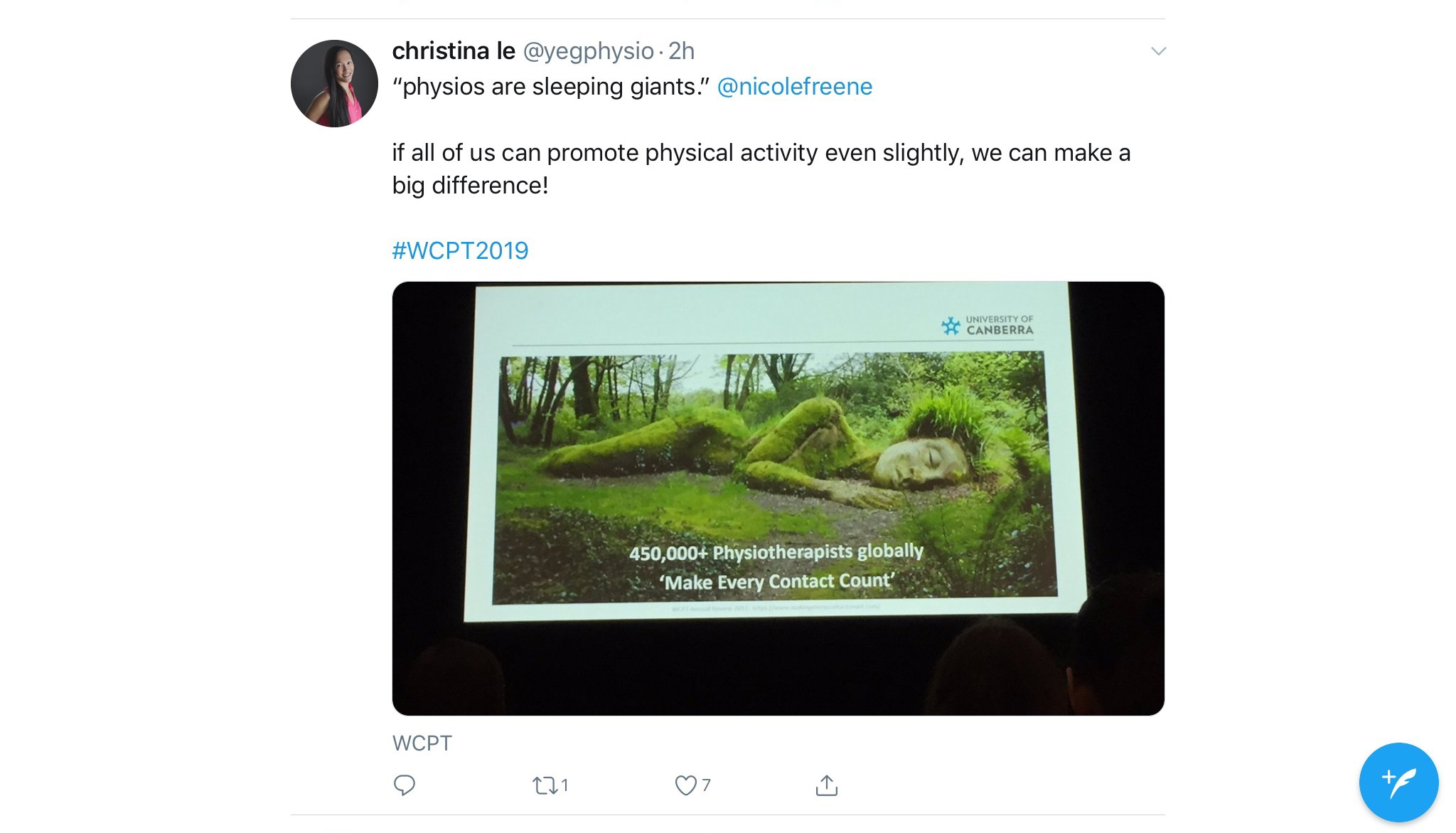The Physio Crisis
May 12, 2019
Musculoskeletal physiotherapy I think is going through an identity crisis. I don't mean the kind that makes it dye its hair, wear leather trousers, or tries to impress other professions half its age. Rather I think musculoskeletal physiotherapy is struggling to find its place and purpose in healthcare system and so is trying to do new things and is loosing sight of what its real role should be.
The physiotherapy profession has produced a huge amount of research in the last 20 years in an attempt to demonstrate its worth and effectiveness. However, a lot of it highlights that physiotherapy has little to no significant effect above placebos, natural history, or regression to the mean, and people are beginning to notice (ref).
This has created a lot of debate within physio with many advocates fighting hard for their cherished treatments, and others like myself questioning their worth. Some have talked about this crisis with blogs telling us how 'physio will eat itself' and books called 'The End of Physiotherapy' both of which I urge you to read.
However, physiotherapy continues to desperately search for evidence to prove it worth and earn its place within healthcare, with debates and arguments raging on about what are the best treatments for this pathology or that problem. But has physiotherapy and many within it (including myself) focused its efforts and energy in the wrong place? Has physiotherapy lost sight of what it could be preventing rather than what it can treat, and is it in need of a drastic shift in its identity of what it does and how it does it as a profession?
Treat or Prevent?
The vast majority of physiotherapy research and physios themselves invest a lot of their time, energy and effort into diagnosing and treating pathology, disease, and disability. This is clearly important and should be continued, but what about the other side of the coin? What about our efforts in the prevention of pathology, disease, and disability?

Does the physiotherapy profession invest as much time, energy, and effort trying to prevent disease, and disability as it does trying to treat it? Does the physiotherapy profession place as much importance and relevance on the promotion of health and wellness as it does on the treatment of sickness and illness?
Simply put... HELL NO!!!
Most, if not all of physiotherapy's training, research, practice, and effort is focused on the reduction of pain and the improvement of function in those WITH disease or pathology. Very little, if any time, attention, or resources are given to ideas, methods or strategies to prevent or reduce the prevalence of disease and pathology.
Simply put... Physiotherapy is a reactive profession, not a proactive one!
And this applies not just to physiotherapy but to all of healthcare, with the National Health Service in the UK better described as the National Sick Service as it does very little to help educate, influence or change the nations behaviour to help improve its health.
Now I am not just trying to be hyper-critical or overly negative here, and I know there are some within the NHS and some physios who do work proactively in some health promotion roles, but they are in the minority, and they are not well supported, funded, seen or heard. This, in my opinion, needs to change drastically.
Currently, physiotherapy along with many other healthcare sickcare professions are bogged down in the endless ever-increasing pressures of treating pain, pathology, disease, and disability to do much about the prevention or reduction of them. This is a classic vicious cycle if there ever was one, and it's one that is leading us into a right royal shitstorm.
Tsunami of Disease
With an ever-increasing ageing population that is doing less and less physical activity, with poorer and poorer lifestyle behaviours, declining health, and greater co-morbidities, are inevitable and our healthcare system is facing a tsunami of chronic illnesses and disabilities that it can never hope to manage and is going to be swamped very soon.
It is estimated that by 2050 the UK's population will have expanded by another 10 million people with a significant increase in those over the age of 60 (ref). This increasing elderly population will have far higher rates of chronic long lasting morbidities such as obesity, diabetes, and cardiovascular disease, that will require long term treatments and support.
It is estimated that in just 10 years over half of the UKs population will be clinically obese and the associated health issues of this alone will cost the NHS a staggering £25 billion (ref). Thats more than all the budgets for research into cardiovascular disease, cancer, and diabetes combined (ref).

There is no way our healthcare or financial systems can cope with this, and if they only keep focusing on treating rather than preventing disease it will soon find itself overrun by the chronically ill and disabled needing constant care. Therefore, more time, effort, resources and opportunities need to be placed as a priority into the prevention of disease and illness, and I think the physiotherapy profession is in a prime position to help here.
However, as I said the physiotherapy profession is very much focused on only the diagnosis and treatment of disease and illness rather than the promotion of health and wellness. And if you don't believe me just take a look at its recent training, career structure, and its position within health care and society in general, especially now with it emphasis on first contact, extended scope, and advanced practitioners who essentially are cheaper, poorly trained, and less skilled GPs and specialist registrars!
Physio Training
Currently, in most physiotherapy training very little time is spent on health and wellness promotion and advocacy. This needs to change! More emphasis, time, and energy are needed to train and enthuse current and future physios on the importance of health promotion and advocacy in all those they see.
physios need more support, encouragement, training and skills in how to communicate, motivate and encourage behavioural change in all those they see with some minor aches and pains or injury, knowing how to overcome barriers and obstacles to healthy lifestyles, far more than they need to know what settings to use on an ultrasound machine, where to place an acupuncture needle, or how to go a grade 3 mobilisation on L4/5.
Physio Careers
Most if not all musculoskeletal physiotherapy career pathways are focused on and dedicated towards extended or advanced skills in diagnosis and treatment, there are virtually no career options for those physios who want to focus on health and wellness promotion. This needs to change!
For an MSK physiotherapist to progress their career they have to do further training in either manual therapy, acupuncture, dry needling, diagnostic imaging, injections, blood tests, even prescribing medications. For an MSK physio to be seen as advanced, enhanced, or specialised they have to twist, contort, and turn themselves into some bastardised version of a doctor, registrar, or radiologist. I know this because I have done it myself, and I don't like it.
And this is not to be disparaging, negative or critical of all the ESPs, APPs, or FCPs or whatever you want to call them, as again I am one, and I know there are some excellent ones doing some excellent work. But where are the Extended Scope Physios in health promotion?
Where are the Advanced Physio Practitioners in exercise and activity prescription? Where are the First Contact Physios in schools educating children on the importance of healthy lifestyles?

The MSK physiotherapy profession needs to take a long hard look at its training and career structure, and stop placing as much emphasis and credence on skills that only diagnose or treat those with pain and pathology. It needs to start to place more emphasis, training, focus on skills and attributes that promote health and wellness. Simply put we need more physios enthusiastic and striving to become health and wellness advocates, not junior doctors.
Physio in society
Currently, most if not all MSK physiotherapy is positioned in reactive roles, treating people with problems sent to them. It is also still very much seen as a junior, inferior, even subservient profession to other medical professions. This needs to change!
More MSK physiotherapy needs to position itself outside of hospitals and medical centres, and into gyms, health centres, and even schools. Health promotion and advocacy should begin from a young age and physiotherapy should be lobbying governments and pressuring policymakers about the benefits of placing physiotherapists and health and wellness teachers into the national curriculum.
MSK physiotherapy wants to try and position itself as being seen as a profession that helps promote health and wellness as much as it helps treat disease and illness. Our leaders and societies need to do more to push this forward using lobbying and other political pressure.
With the World Congress of Physiotherapy currently on in Geneva this weekend, it is encouraging to see the odd slide and comment about this already, but more needs to be done and I do wonder how much of this is talk and how much action will come of it?

Summary
As I mentioned at the beginning, the MSK physiotherapy profession needs a drastic shift in its identity and thinking of what it is, what it does, and where its role and worth lies. Is it in the diagnosing and treatment of pain and pathology, which hasn't been shown to be that great or effective, or is it more in the prevention and reduction of pain and pathology through the promotion and advocacy of health and wellness?
Obviously, the answer is both! But at the moment MSK physiotherapy is very much focused on the treating more than the preventing, it's more reactive than proactive, and if it wants to survive and be taken seriously as a 'health care' profession this needs to change!
As always thank for reading
Adam
Stay connected with new blogs and updates!
Join my mailing list to receive the latest blogs and updates.
Don't worry, your information will not be shared.
I hate SPAM, so I promise I will never sell your information to any third party trying to sell you laser guided acupuncture needles or some other BS.

